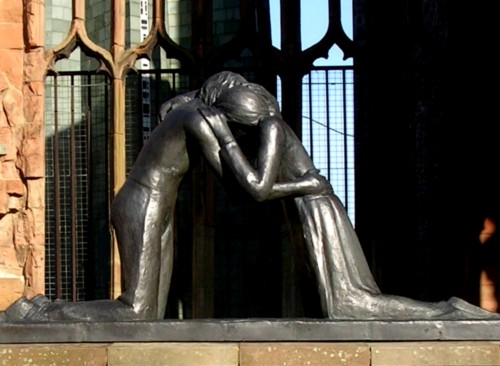Give Thanks In Everything
Respond To What Happens Don’t React
Don’t seek for everything to happen as you wish it would, but rather wish that everything happens as it actually will – then your life will be serene.
Migrants In Calais
To give thanks in everything sounds like a pious platitude, but it is rather more than that.
So without resorting to fancy word play or appealing to debatable religious or belief based perspectives what exactly does this mean - and more importantly how can we do this and why would we even want to do this anyway?
In The Power of Gratitude we reviewed the many research based benefits of the basic practice of gratitude and we noted that:
"As with mindfulness, gratitude can occur spontaneously but it is not the default position of how our minds function. It requires conscious effort over a period of time to 'reprogramme' your thinking processes and emotional responses to live a life of gratitude."
Based on my own experiences I outlined a number of simple, practical guidelines for developing a regular basic practice of gratitude for giving thanks for all the good things in your life.
However, giving thanks in everything takes gratitude into another dimension.
This is advanced gratitude.
What Does It Mean To Give Thanks In Everything?
My personal start point with this is that:
- My life is full of things I don't want, that frustrate me, and that I want to change.
- My default response to all these things is one of considerable resistance.
As I move beyond my knee-jerk default response and into a more considered view I have to decide whether or not there is anything I can do about the things that I don't want.
Inevitably many of these things are out of my control and I can't change them. The recent pandemic is one obvious example.
This is where the advanced level of gratitude takes place.
This is where I have a choice.
I can't change my circumstances but I can choose how I will respond.
How To Give Thanks In Everything - Three Guidelines
I offer you 3 guidelines as to how and why we can learn to give thanks in all circumstances:
- Amor Fati
- Agape
- Acceptance
We need to be very careful in our choice of words and how we frame this.
1. Amor Fati [Love of Fate]
In The Daily Stoic blogger Ryan Holiday presents the Stoic approach of Amor Fati which translates as a "love of fate".
This is one of the core stoic approaches to life and the basic idea is that we should embrace everything that life throws at us regardless of whether it is something that we do want or something that we don't want.
The stoics encouraged us to not only embrace what life throws at us but to actually love it - hence the phrase "love of fate".
In my view this is one of those ideas that sounds wonderful and very profound in theory and which in practice is generally applicable. But it is not applicable in all cases.
In my view this teaching has a significant fault line which I will discuss below together with my presentation of an alternative and more expansive meaning.
But firstly let's listen to what others have said about it.
The Roman Emperor Marcus Aurelius said of Amor Fati, that it is:
“A blazing fire makes flame and brightness out of everything that is thrown into it.”
The former slave Epictetus said:
“Do not seek for things to happen the way you want them to; rather, wish that what happens happen the way it happens: then you will be happy.”
The German philosopher Friedrich Nietzsche defined this:
“That one wants nothing to be different, not forward, not backwards, not in all eternity. Not merely bear what is necessary, still less conceal it… but love it"
Blogger Ryan Holiday unpacks this and says that the goal is:
Not: "I’m okay with this."
Not: "I think I feel good about this."
But: "I feel great about it. Because if it happened, then it was meant to happen, and I am glad that it did when it did. I am going to make the best of it."
Bestselling author Robert Greene has echoed this perspective, by saying that we need to:
“...accept the fact that all events occur for a
reason, and that it is within your capacity to see this reason as
positive.”
I have great respect for Ryan Holiday and Robert Greene and their work. They have contributed greatly and offered much to our understanding of of the field of personal development. So it is with deep respect I have to say:
"Gentlemen, I fundamentally disagree with you on two points:
- There are certain things that happen in life when it would be wrong and totally inappropriate to say that I am glad that happened and I am going to make the best of it.
- We can not say that all events happen for a reason and that it is in our capacity to see that reason as positive. Many things happen for which there is no discernible reason. Robert Greene is overlooking the randomness of many things that happen."
One of many examples I can think of is the tragic and unforeseen death of my 28 year old god-daughter a few years ago. She was studying for a doctorate in science and led a full and active life before being struck down with brain cancer, which killed her in 8 short months
I do not think that her parents will ever say that they are glad that it happened and in this context that is a ludicrous and deeply insensitive thing to say.
I also can see no reason for her death. It was, as are so many difficult things that we experience, a random tragedy.
There are many appalling things that happen to us and that frequently are imposed upon us by the actions of others or the random twists of fate.
As a further dramatic example, I do not think that victims of rape and other forms of sexual and physical violence, are ever going to love their fate. The very thought is repugnant.
Ryan Holiday and Robert Greene are not stupid men and I am not accusing them of deliberate insensitivity, but I do think they/we need to be very
careful in our choice of words and how we frame what we say with due
regard to the impact and consequence of our pronouncements.
Whole truth, partial truth and untruth
As is so often the case in the world of self-help and personal development a partial truth is presented as a whole truth and it can, on occasions, become an untruth.
The Important Distinction Between Ordinary and Extra-ordinary Events

There are a great many unwelcome and unwanted things that can happen to us and fall into the category or "ordinary" insofar that there is nothing special or note-worthy about them other than that they are unwelcome.
In these situations, in my view, it is appropriate and constructive to look for the learnings and meanings in what has happened and to find aspects of these situations to give thanks for.
But there are more occasional events which are not ordinary "run of the mill" set-backs and irritations, these are events that are extra-ordinary and usually life-changing and often tragic - such as the example I shared above.
In these situations the magnitude and scale of these tragic events require a different approach and we can and should by-pass the search for reasons and meanings and, at an appropriate place in the grief cycle, move towards a position of acceptance.
Looking For Meaning
In my view, we have to be very careful how we look for meaning in ordinary and extra-ordinary events.

We should never under-estimate our very human capacity for cognitive distortion and for seeing a meaning that we want to see, or seeing a meaning that supports a cherished belief or faith position.
I am not decrying deeply held beliefs or faith positions, but I am counseling conscious awareness of how you are ascribing meaning.
In my view, a good baseline position is to adopt the existentialist perspective that the meaning of an event or situation is what you choose it to be, taking note that the framing of that meaning needs to be exercised with discernment and care, and aligned with your values and sense of purpose in life.
This is a practical and empowering position to adopt, and one which I support.
Having the grace to accept that I just don't know
But I would also suggest that there will be times when we can not see a meaning, point or purpose to what has happened. That does not necessarily mean there isn't one, it simply means that it is beyond our grasp i.e. we don't know and we don't know what we don't know, nor do we have the wherewithal to determine how we could know.
If this is case then I would recommend the more reflective perspective of humility that says "I don't know" and that has the grace to accept that "I don't know".
2. Agape love
With deep bows of sincere respect to the Stoics and Ryan Holiday and Robert Greene, in my view we need to be more clear and precise in our terminology.
Specifically, the word translated as "Love" [of Fate] need to be reframed to arrive at what I perceive to be its intended meaning.
The latin word Amor denotes the Roman god of love and is used in the passionate and romantic sense and equates to the Greek word Eros. For the reasons discussed above this is the wrong word to describe an appropriate response to fate.
In Greek thought there were seven different words for "love", common and well known usages could be "Eros" erotic and sexual love or "Philos" which is filial or brotherly love.
In my view the most appropriate love word is "Agape" which is not an emotion-based word, Agape is not about feelings.
- Agape love is not an emotional response, it is expressed "come what may".
- Agape is unconditional, committed and accepting love, it is a dutiful love and it is a universal love, and in all cases is the result of a conscious choice and an act of the will.
- Agape is a consciously chosen attitude to a person and/or an entity [such as Fate/Emptiness/Life/God/Allah depending on your perspective].
Agape is a seeing beyond the
person or situation that is presenting, and knowing that beyond the
limits of human comprehension there is - or could be - a transcendent
dimension of consciousness, a holistic dimension, where all of the
threads of human experience are gathered up and woven into a far larger
tapestry.
3. Acceptance
Acceptance is the gateway to being able to give thanks in everything.
Acceptance is also a significant part of the answer as to why we want to give thanks in everything.
I want to reprise a few key points here from The Transformative Power Of Acceptance:
The transforming power of acceptance is that it:
- Unfuses your thinking mind from your observing mind.
- Stops you identifying with the torrent of words and thoughts it is constantly spewing out.
- Unhooks your dependence on a change in outer circumstances before you can make an inner change.
- Releases your "stuck in waiting" and always looking forward or backwards.
- Releases your resistance to what is happening in your life.
- Brings you peace and calm.
- Centres you in the present moment, now.
How To Give Thanks In Everything By Being Grateful
I have a lot of respect for the work of blogger Steve Pavlina and I often find that he is very articulate and eloquent in describing spiritual states and experiences in non faith-based, neutral language.
From time to time I do find myself running out of words to describe things that I have experienced without reverting to faith based language or using flowery poetic language.
So let's listen to Steve Pavlina talking about what its like to move from doing grateful to being grateful.
“How wonderful it is to exist!
- Circumstances are irrelevant because this form of gratitude is a choice that needs no justification.
- It is a sense of utter fascination with the very notion of existence. You become grateful for the adventure that is life, including all of its twists and turns.
- This form of gratitude is synonymous with unconditional love because there is no attachment to circumstances or outcomes.
- Consequently, there is no fear of loss or change.
- When your feelings of gratitude are conditional upon temporary circumstances like your stuff, your job, and your relationships, your base identity doesn’t change.
- But when you root your gratitude in something permanent, it becomes a permanent part of you. Instead of saying, “I am grateful for…” you just say, “I am grateful.
When you feel grateful for existence itself, you move from doing grateful to being grateful."
Final Takeaways
To recap, the 3 guidelines to the advanced practice of gratitude and giving thanks in all circumstances are:
- Amor Fati - Knowing that you have a choice and you choose how to respond.
- Agape - Having a commitment to a response that can find eventual acceptance in all circumstances, and also find the learnings and possible meanings in the ordinary day by day circumstances of unwelcome events
- Acceptance - Practicing deep acceptance and experiencing the power of the freedom that it gives you from the tyranny of: your thoughts and emotional responses; the events and circumstances of your life; your attachment to circumstances and outcomes; and the freedom it gives you to align with the flow of life.
As with all the mindfulness based practices that I have shared on this site the execution of giving thanks in all circumstances is very straightforward and simple to do.
The difficulty comes from your
innate resistance to doing this and your thinking mind/monkey mind's
endless need to over-think this and give you a stream of reasons why
you're not ready or you need more information - in fact any excuse just
to not do it.
The route to moving to a state of being grateful is in these 2 simple powerful practices:
- Deep Acceptance - deal with the pain of your thoughts and emotions via this practice and reach a place of peace and calm quickly [you may also want to undertake some self dialogue]
- Mindfulness Practice - each day, just focus on this day and then narrow your focus down to this moment. Be at peace and free of your thoughts and emotions the only place you ever can be - now!
My experience with all this is a daily one. There are a number of issues in my life - some of them longstanding - and when I feel the resistance rise within me I immediately move through the deep acceptance process until I am at peace.
When - as frequently happens - I find myself worrying about the future and what might or might not happen and when, I bring myself back to the only reality there is, the present moment.
I have learnt to keep "short accounts" with myself and if something is troubling me to deal with it quickly and get back to a state of peace as fast as possible.
I have also found that it helps to narrow my focus down to today - this one day - and treat it as though it was my last day in this life.
To misquote and adapt the famous biblical saying in Psalm 119 verse 106:
Mindfulness practice is a lamp unto my feet, and a light unto my path.
Further Reading On Acceptance:
The Transforming Power Of Acceptance
Further Reading On Gratitude:
Ryan Holiday - Gratitude is a Daily Practice
Being Grateful - What the Buddha Taught About Gratitude
Next Article: Recognising Limbo As A Stage Of Transition
Return from "Give Thanks In Everything" to: Walking The Talk
Contact me
LATEST ARTICLES
The Inner Weight of Shame - Sustained By Attentional Fixation
 A Mind That Is Continuously Engaged In Self-Surveillance. Shame is one of the heaviest inner burdens a human being can carry. It does not announce itself loudly or demand attention through drama. Inst…
A Mind That Is Continuously Engaged In Self-Surveillance. Shame is one of the heaviest inner burdens a human being can carry. It does not announce itself loudly or demand attention through drama. Inst…Does Prayer Work? The Psychology of Prayer, Meditation and Outcomes
 Reality Is A Complex System Of Countless Interactions - Including Yours. So does prayer work? The problem is that the question itself is usually framed in a way that guarantees confusion. We tend to a…
Reality Is A Complex System Of Countless Interactions - Including Yours. So does prayer work? The problem is that the question itself is usually framed in a way that guarantees confusion. We tend to a…Living in Survival Mode Without Surrendering Mental Authority
Living in Survival Mode Without Surrendering Mental Authority
 Clear Thinking When You’re Just Trying to Stay Afloat. Many people today are overwhelmed because they are living in survival mode - not temporarily, but as a persistent condition of life. For many, th…
Clear Thinking When You’re Just Trying to Stay Afloat. Many people today are overwhelmed because they are living in survival mode - not temporarily, but as a persistent condition of life. For many, th…Manifestation Without Magic: A Practical Model
 Manifestation without magic is not a softer or more intellectual version of popular manifestation culture. It is a different model altogether. Popular manifestation teachings tend to frame reality as…
Manifestation without magic is not a softer or more intellectual version of popular manifestation culture. It is a different model altogether. Popular manifestation teachings tend to frame reality as…Staying Committed When You Can't See Progress - The Psychology of Grit
 Uncertainty Is Not The Absence Of Progress, Only The Absence Of Reassurance. One of the most destabilising experiences in modern life is not failure, but uncertainty and staying committed when you can…
Uncertainty Is Not The Absence Of Progress, Only The Absence Of Reassurance. One of the most destabilising experiences in modern life is not failure, but uncertainty and staying committed when you can…The Battle For Your Mind - How To Win Inner Freedom In A Digital Age Of Distraction
 From External Events to Inner Events. We often think of “events” as things that happen out there: the traffic jam, the rude comment, the delayed email reply. But what truly shapes our experience is wh…
From External Events to Inner Events. We often think of “events” as things that happen out there: the traffic jam, the rude comment, the delayed email reply. But what truly shapes our experience is wh…How to See Your Thoughts Without Becoming the Story
 A Practical Guide to Thought-Awareness. You can spend your life inside the stories of your mind without ever learning how to see your thoughts clearly and objectively. Most of the stuff we tell oursel…
A Practical Guide to Thought-Awareness. You can spend your life inside the stories of your mind without ever learning how to see your thoughts clearly and objectively. Most of the stuff we tell oursel…The Collison Decision Matrix - A Simple Framework for Better Choices
 The Collison Decision Matrix Is A Practical Everyday Thinking Tool. Most of us spend a surprising amount of time worrying about decisions. From small ones such as what to wear, what to eat, what to te…
The Collison Decision Matrix Is A Practical Everyday Thinking Tool. Most of us spend a surprising amount of time worrying about decisions. From small ones such as what to wear, what to eat, what to te…The Power Of Asking The Right Question
 The Power Of Asking The Right Question Lies In The Quest For Insight. To experience the power of asking the right question you must develop the practice of asking questions. The best way to improve th…
The Power Of Asking The Right Question Lies In The Quest For Insight. To experience the power of asking the right question you must develop the practice of asking questions. The best way to improve th…Site Pathways
 Here is a site pathway to help new readers of Zen-Tools navigate the material on this site. Each pathway is based around one of the many key themes covered on this site and contain a 150 word introduc…
Here is a site pathway to help new readers of Zen-Tools navigate the material on this site. Each pathway is based around one of the many key themes covered on this site and contain a 150 word introduc…How To Live With Contradiction - Beyond Thought Let Stillness Speak
 A major impact on so many peoples' lives is the situational contradiction of unfilled realistic expectations. So where does all this leave us? Well here we are, with mental equipment that is more lim…
A major impact on so many peoples' lives is the situational contradiction of unfilled realistic expectations. So where does all this leave us? Well here we are, with mental equipment that is more lim…




